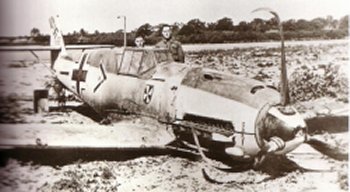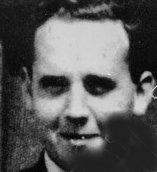| For the pilots of No 87
there was to be little respite once they had regrouped in England after
the end of the Battle of France. David continued to fly during the
Battle of Britain, for which 87 Squadron was moved to Exeter, where it
saw heavy fighting and took a severe toll of the enemy. David continued
his remarkable run of combat victories. He shot down two aircraft on the
11th of August, a Ju88 and a Messerschmitt 109. He was credited with two
more, a Ju87 "Stuka" and a Messerschmitt 110 twin-engined
fighter, besides having a half share in another Me110 on the 15th of
August; this was the day of Germany's heaviest losses in the air, and
was ever after referred to in Luftwaffe circles as as der schwarze
Donnerstag - "Black Thursday". No 87 played its part in
repelling the 1,786 sorties that were launched at Britain that day.
David's third "two-kill" day was the 25th of August, when he
shot down another Ju88 and a Messerschmitt 109. In October,
he was posted as a flight commander to 213 Squadron, another Hurricane
squadron, also based at Exeter. David's final kill was on the 19th of
October when he shot down a Ju88 to bring his score to 20. In
November he was posted to No 152, a Spitfire squadron. Thereafter he
spent two years training pilots, many of whom were Poles, Free French,
Norwegians, Dutch, Belgians and Americans who had joined the RAF. In
1943 he was sent to the Western Desert to command 89 Squadron, equipped
with night-fighting Beaufighters. He was then ordered to take the
squadron to Ceylon. In 1944 he was
promoted to group captain and posted to the Burma theatre. There, in the
early days of 1945, a colossal air and naval bombardment was being
prepared as the precursor of a full-scale attack on Akyab Island, which
was known to be occupied by three Japanese battalions. In a final
recconnaissance before this attack was launched, David and an artillery
spotting officer flew over Akyab and noticed a complete absence of
Japanese aircraft on the airfield there. David and the artillery officer
promptly landed at Akyab, where the headman told them that the Japanese
had gone. Thus, the assault, which would probably have killed innocent
villagers, was called off. David and the officer had, effectively,
"captured" Akyab themselves!! |

|

